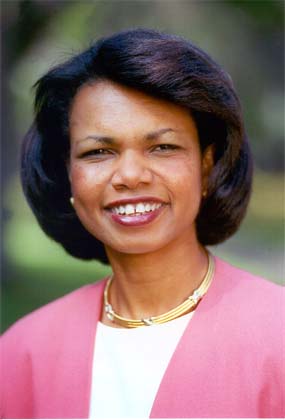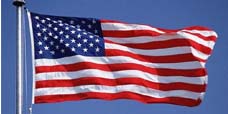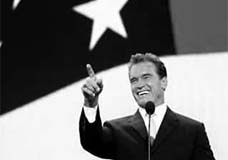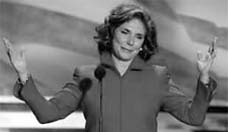
The frequency and location of Condoleezza Rice's speeches differ sharply from those before this election year -- and appear to break with the long-standing precedent that the national security adviser try to avoid overt involvement in the presidential campaign
Rice Hitting the Road to Speak
National Security Adviser's Trips to Swing States Break Precedent
By Glenn Kessler
Washington Post Staff Writer
Wednesday, October 20, 2004; Page A02
In the weeks leading up to the Nov. 2 election, national security adviser Condoleezza Rice has traveled across the country making speeches in key battleground states, including Oregon, Washington, North Carolina and Ohio. In the next five days, she also plans speeches in Pennsylvania, Michigan and Florida.
The frequency and location of her speeches differ sharply from those before this election year -- and appear to break with the long-standing precedent that the national security adviser try to avoid overt involvement in the presidential campaign. Her predecessors generally restricted themselves to an occasional speech, often in Washington, but counting next week's speeches, Rice will have made nine outside Washington since Labor Day.
Rice frequently supplements her speeches with interviews with local media, generating positive coverage -- including a Page One news story in Portland's largest newspaper. Although she does not mention Democratic challenger John F. Kerry and avoids answering overtly political questions, the target of her speeches is not lost on local audiences. The Seattle Times, reporting on a Sept. 7 speech to the University of Washington, said, "Rice sounded at times like a candidate" as she received "rousing ovations" in defending the administration's handling of the war on terrorism.
Speaking to the City Club of Cleveland last week, after Kerry attacked President Bush in the debates for failing to capture Osama bin Laden, Rice said there was "a debate in our country" over the war on terrorism.
"For some, it is a limited engagement whose goal is to go after bin Laden and al Qaeda, assume a defensive posture at home, put it out of our minds and just hope they do not attack us again," Rice said, echoing the campaign's assertion that Kerry's worldview predates Sept. 11, 2001. "They see a narrow struggle against a narrow enemy. This is a fundamental misunderstanding about what happened to us on that fateful September day."
The White House has said that Bush ordered Defense Secretary Donald H. Rumsfeld and Secretary of State Colin L. Powell to avoid getting enmeshed in the campaign. Four years ago, Bush campaign spokesman Ari Fleischer decried "the very inappropriate continuing pattern of the politicization" of "historically nonpolitical agencies" after two Clinton Cabinet officials criticized policies Bush advocated.
But White House officials defended Rice's speechmaking, saying she has received 4,000 requests and invitations since the start of the administration and has averaged about 17 speeches a year.
"At the risk of stating the obvious, part of the job today of national security adviser is to discuss our nation's national security policy. Dr. Rice has continued the nonpolitical tradition of the post, but being nonpolitical doesn't mean being non-accessible," said James R. Wilkinson, deputy national security adviser. "At a period in U.S. history when national security is on the minds of the American people more than ever, she's proud to discuss the president's foreign policy agenda, and she considers it important to make herself accessible to citizens in their communities and to local reporters who have questions of their own."
Rice has given two-thirds of her 68 speeches in the Washington, D.C., area, and she gave no speeches in battleground states before last May, according to records supplied by the White House. In previous years, she delivered most of her out-of-town speeches in such locations as New York, Chicago, Texas and California, her home state. In fact, in September and October of 2003, 2002 and 2001, Rice gave two or fewer speeches outside Washington, the records show.
White House officials, of course, often have private meetings with groups critical to a president's electoral success, so it is difficult to compare Rice with other national security advisers. But her nine speeches in battleground states in the final eight weeks of the election appear to cross a new threshold, according to White House records and news reports.
Henry A. Kissinger, President Richard M. Nixon's national security adviser, raised eyebrows when he appeared in a 1972 film endorsing Nixon at the Republican National Convention, but appears to have made no speeches in the final weeks.
Zbigniew Brzezinski, national security adviser to President Jimmy Carter, made two speeches outside Washington -- in Mobile, Ala., and New York -- during Carter's losing reelection battle in 1980. Of Rice's nine speeches, he said, "That is certainly politicizing the job. I can't speak for the other national security advisers, but my recollection is we viewed the job as not a highly political one, to the extent that's possible being that close to the president."
Powell, national security adviser to President Ronald Reagan, gave one speech to the National Press Club a week before the election in 1988.
During the 1992 reelection campaign of President George H.W. Bush, national security adviser Brent Scowcroft went to Dallas to try to persuade H. Ross Perot not to reenter the race, but he made no speeches.
Anthony Lake, who held the job under President Bill Clinton in 1996, gave one speech on Northern Ireland and one on Japan -- both in Washington. Samuel R. "Sandy" Berger, who held the post when Al Gore was battling Bush four years ago, gave one speech, at Georgetown University.
The Kerry campaign said Rice's travel was inappropriate. "America would be a lot better off if Dr. Rice spent more time worrying about Osama bin Laden's job security and less time worrying about her own," said Kerry spokesman Mark Kitchens.
Researchers Lucy Shackelford and Madonna Liebling contributed to this report.





